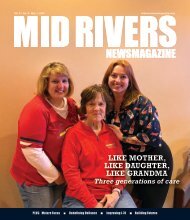Mid Rivers Newsmagazine 6-21-17
Local news, local politics and community events for St. Charles County Missouri.
Local news, local politics and community events for St. Charles County Missouri.
You also want an ePaper? Increase the reach of your titles
YUMPU automatically turns print PDFs into web optimized ePapers that Google loves.
24 I COVER STORY I<br />
June <strong>21</strong>, 20<strong>17</strong><br />
MID RIVERS NEWSMAGAZINE<br />
@MIDRIVERSNEWS<br />
MIDRIVERSNEWSMAGAZINE.COM<br />
In St. Charles County courts,<br />
kids can count on a special friend<br />
By BRIAN FLINCHPAUGH<br />
Sully doesn’t mind if his ears are pulled,<br />
if his hair is mussed or if the hugs around<br />
his neck are bit tight – it’s all in a day’s<br />
work.<br />
Last November, Sully joined the St.<br />
Charles County prosecuting attorney’s<br />
office. But he isn’t your typical dogged,<br />
hard-nosed prosecutor. He’s just a dog.<br />
Actually, he’s more like a comforter. A<br />
2-year-old golden retriever, he has an<br />
important role – that of “courthouse dog”<br />
or “facility dog,” as proponents prefer.<br />
Trained at a women’s prison, he likes<br />
dishing out his own unique brand of affection<br />
– a lick to the face or hand, a gentle<br />
nuzzle with his wet nose or maybe just staying<br />
quietly close enough to calm victims<br />
who find themselves in the criminal justice<br />
system, particularly children involved in<br />
sexual, emotional or physical abuse.<br />
Sully is one of a growing number of<br />
highly trained assistance animals in St.<br />
Charles and St. Louis counties. He is more<br />
frequently called in to provide assistance<br />
to children who face being interviewed<br />
for depositions or participating in court<br />
proceedings and trials. His job might be<br />
likened to someone who can hold hands,<br />
although in this case, holding a paw may<br />
be more appropriate.<br />
“I think [of him] more as a comfort<br />
item because that’s really what he does,”<br />
explained Assistant Prosecuting Attorney<br />
Rebecca Shaffar, Sully’s boss, who takes<br />
him home at the end of each day and cares<br />
for him. “Being a dog, he gives some comfort<br />
and possibly some security so [victims]<br />
can then talk or don’t feel afraid with<br />
him there.”<br />
Reka<br />
The idea of dogs providing this<br />
kind of support is not new. According<br />
to a paper published by the<br />
American Bar Association, in the<br />
<strong>17</strong>00s, Society of Friends officials<br />
said farm animals may have helped<br />
with the rehabilitation of patients at<br />
a facility they founded in England<br />
for people with mental illnesses. The<br />
concept gained traction in the U.S.<br />
legal system starting in 2003, when<br />
Seattle prosecutor Ellen O’Neill-<br />
Stephens promoted the use of highly<br />
trained assistance dogs to provide<br />
comfort to children and adults who<br />
were victims of crime. O’Neill-<br />
Stephens and veterinarian Celeste<br />
Walsen founded the Courthouse Dog<br />
Foundation in 2012, which promotes<br />
the support dog concept in the U.S.<br />
and internationally.<br />
In the local court system, Reka, Sully<br />
a 4-year-old chocolate Labrador<br />
retriever, is a true pioneer. Since 2015, she<br />
has been working at The Child Center in<br />
Wentzville, a child advocacy center that<br />
works with state and local agencies in a<br />
multi-county area, supporting children who<br />
are victims of sexual or physical abuse, or<br />
who may have witnessed violent crimes.<br />
TRUE CHAMPS<br />
Both Sully and Reka are graduates of<br />
CHAMP Assistance Dogs, Inc., a nonprofit<br />
organization based in North St. Louis<br />
County. CHAMP stands for Canine Helpers<br />
Allow More Possibilities and is one of<br />
several local not-for-profit organizations<br />
training dogs for a variety of tasks. Nola<br />
Ewers, director of CHAMP’s assistance<br />
dog program, said facility dogs also are<br />
used in St. Louis City and St. Louis County<br />
courts. Most work with counselors or<br />
trained handlers to use their special skills<br />
in a more public setting.<br />
Sully is unique. Handled by a staff<br />
member, rather than a volunteer, authorities<br />
say he may be one of Missouri’s first fulltime<br />
courthouse dogs. His role, according<br />
to Ewers, “is to make the kids feel able to<br />
tell whatever may have happened.”<br />
“Particularly with children, it can be<br />
intimidating to be there and tell their side<br />
of the story,” Ewers said. “The dog there<br />
gives the child something else to focus on<br />
so they can kind of get a little bit of that<br />
stress and anxiety out, so they can tell their<br />
side of the story to prosecutors and everyone<br />
in the courtroom.”<br />
Shaffar said Sully shows up for<br />
work every day at the prosecutor’s<br />
office with Shaffar, gets dressed in<br />
his special vest [identifying him as<br />
a facility dog] and collar, and begins<br />
his day. He can appear in the courtroom<br />
and sit quietly. Often, he comes<br />
to an interview room. Typically, he<br />
sits on one end of a couch and puts<br />
his head on a child’s lap to be petted.<br />
The interaction is always supervised<br />
by Shaffar, who says Sully also helps<br />
the prosecutors.<br />
“It [Sully’s presence] certainly<br />
makes the kids easier to talk to,” she<br />
said.<br />
That’s also true of Reka, said Amy<br />
Robins, supervisor of forensic services<br />
at The Child Center and one of<br />
Reka’s three handlers. Reka’s primary role<br />
is to sit with children during a “forensic<br />
interview,” in which staff members have<br />
to ask them detailed questions about what<br />
may have happened to them.<br />
The interviewers are child-friendly but<br />
have to remain neutral and unbiased – they<br />
can’t respond in the same way to a child<br />
crying as they would outside an interview<br />
situation. The interview also is viewed<br />
by prosecutors and other staff. Kids over<br />
5 know that and often feel intimidated,<br />
Robins said, adding that Reka seems to<br />
understand this situation.<br />
“Sometimes she will do funny things to<br />
try to get them to laugh,” Robins said. “If<br />
she has a kid who is crying a lot, she may<br />
try to climb into their lap or try to eat the<br />
tissue that they have. It’s really amazing,<br />
the sense she has for which kids need her<br />
the most.”<br />
Petting Reka can reduce trauma in a<br />
lot of ways – research shows it supports<br />
an increase of serotonin in the brain, so it<br />
allows an increase in comfort, Robins said.<br />
“I’m really not a dog person per se, but<br />
I knew that Reka would be really great for<br />
our agency,” said Robins, who provides<br />
home care for Reka. “It is hands-down the<br />
best decision our agency has ever made.”<br />
IT’S ALL IN THE TRAINING<br />
Sullys and Rekas are rare.<br />
“Not every dog can be a facility dog,<br />
because they obviously have to have the<br />
temperament,” Shaffar said. Sully doesn’t<br />
scare easily or get upset by loud noises. He

















